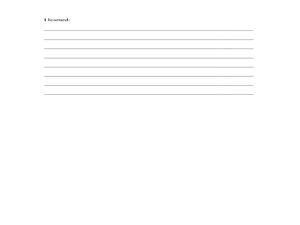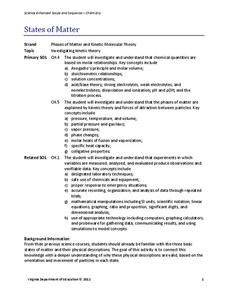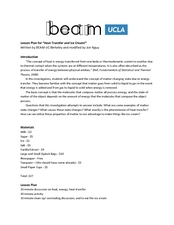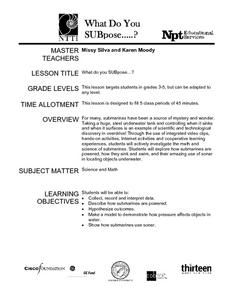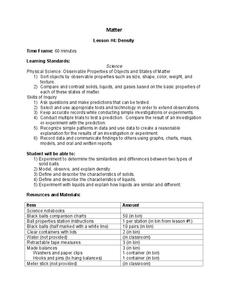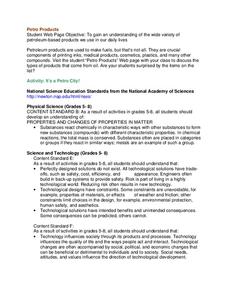Cherry Creek Schools
Physical Science Final Exam Review Packet
If you need a way to assess the concepts in your physical science class, use an extended set of worksheets as a midterm or final exam. It includes questions about density, physical and chemical matter, speed and velocity, weight and...
Michigan State University
Gases Matter
Young scientists learn that seeing isn't necessarily believing when it comes to the states of matter. After performing a fun class demonstration that models the difference between solids, liquids, and gases, children complete a series of...
Curated OER
What's Matter?
Learners explore many of the basic properties of matter including atoms, ions, elements, molecules, and density. The class explores an interactive flash-animated Web site to answer questions and clarify misconceptions they might have had...
Curated OER
Heat and Matter
Students explore liquids and solids by conducting in class experiments. In this matter lesson, students define the properties of matter and how heat can change those properties. Students experiment with heating objects such as butter and...
Curated OER
"States of Matter"
Students investigate the different states of matter by experimenting in class. In this matter lesson, students participate in a lab activity moving from one station to the next creating different formations of matter....
Curated OER
Chemistry Day With Glitter Wands
First graders observe examples of the three states of matter and identify matter in each of the three states. They make glitter wands to remind them of the three states of matter: solid, liquid and gas. Pupils brainstorm and record...
Curated OER
Introduction And Brief History of Materials Science
Students develop an understanding of the concept of matter. They l participate actively in the bubble raft experiment as described on the Center for Thermal Spray Research's website. They demonstrate dislocations and grain...
Curated OER
Measure It Up!
Students investigate the states that water may take. In this physical science lesson, students read the book, Water: Up, Down, and All Around and recall the states of water from the book. Students examine how water takes the shape of its...
Curated OER
What Does It Matter?
Students define matter, the chemical properties of matter, and the physical properties of matter. They name physical and chemical properties of matter (by classifying using a Tree Map). Students determine the mass, volume, and density of...
Curated OER
Exploring Phases of Matter
Learners discuss and experiment with the phases of water. In this phases of matter lesson plan, students recognize the different states of matter. Learners measure and record changes and understand when the state changes.
Mascil Project
Sports Physiology and Statistics
If I want to build up my heart, where should I start? Science scholars use statistics in a sports physiology setting during an insightful experiment. Groups measure resting and active heart rates and develop a scatter plot that shows the...
Curated OER
Making Cents of Density
Learners utilize their knowledge of the physical properties of matter such as mass, volume, and density to solve a problem. They utilize the scientific method to solve a problem. Pupils analyze their data to determine whether their...
Curated OER
Mass vs. Weight
Students explore physical science by conducting a measurement experiment. In this mass instructional activity, students identify the differences between mass and weight and define a list of other vocabulary terms. Students utilize...
Curated OER
"Heat Transfer and Ice Cream!"
Learners analyze earth science by creating a frozen treat in class. In this heat transfer activity, students discuss how matter is transformed from solid to liquid and liquid to gas when energy is removed from the equation. Learners...
Curated OER
What Do You SUBpose?
Submarines are the fous of this math and science lesson. In it, learners explore the world of submarines: how they work, and what they are used for. They engage in hands-on activities, watch video clips, and work in cooperative groups in...
Curated OER
So Fast! So Slow!
Fifth graders give examples of objects that move slow and fast. In this physics instructional activity, 5th graders rank animals according to how quickly they move. They create a bar graph of organisms versus rates of speed.
Teach Engineering
Equal and Opposite Thrust in Aircraft: You're a Pushover!
It's the law—every action requires a reaction, no matter how small. Pupils experience two demonstrations of Newton's third law of motion as it relates to thrust in the 10th segment of a 22-part unit on flight. Using their mathematical...
Curated OER
Aeronautics: Bernoulli's Principle
Students explore physics by participating in a science activity in class. In this flight properties lesson, students identify Bernoulli's principle of flight and his theory of statics and motion. Students conduct a demonstration by...
Curated OER
Balloons: Math with the Montgolfier Balloon
Young scholars discover the history of hot air balloons by watching one ascent. In this physics lesson, students utilize a Montgolfier Hot Air Balloon from an earlier lesson and record the temperature, rate of ascent and the...
Curated OER
Torque Me Off
Students investigate the lever and the mathematics associated with levers. They determine the conditions necessary to balance a system of forces around a fulcrum.
Curated OER
Density
Learners predict when an object will float or sink based on comparison of density of the object to the density of the substance in which it is placed. The access a website and sketch the object in the first column of their table and then...
Curated OER
Petro Products
In this petroleum products worksheet, students are given the components of crude oil and they graph the various products found in a 50 gallon barrel. Students complete an activity to determine if they have collected cards that represent...
Curated OER
Vectors: How Much Force Can You Apply
This lesson entails the viewing of two videos to get an overview of force and its application. The lesson covers how vectors use force in real-world situations.
Curated OER
Beads, Balls, and Beakers
Students analyze the amount of space required to pack round objects. In this geometry lesson, students practice using space economically by practicing packing spheres into beakers. They then translate this concept to molecules being...



